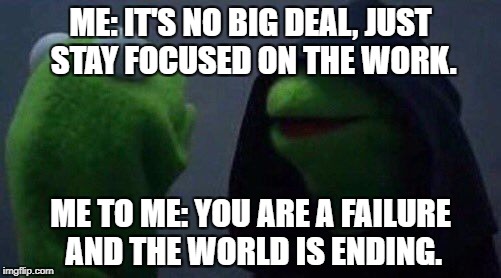A couple of weeks ago I was talking with a close friend about a startup that I’m working on and He. Ripped. Me. To. Pieces.
Not with any malicious intent, but he grilled me about a million things that I wasn’t thinking about at that point and that probably don’t matter yet. Even so, it got under my skin.
“What does he know? That guy sucks. He has no idea what he’s talking about”, was the self-talk running through my mind. While I tried to brush it off, it still bothered the hell out of me—for a few days in fact.

What my friend said was nothing crazy; they were valid points. Beyond that, it should have simply been a reminder of how differently we approach our ideas and ventures. Full stop.
Of course it wasn’t a full stop. That feeling of being attacked resulted in something far worse: it planted a seed of doubt in my mind. It cracked my confidence, ever so slightly and gave the voice in my head some ammunition: Why are you even trying? You should just give up.
It made me question myself and my confidence. It allowed self-doubt to creep into my consciousness.
This is not what you want to be thinking when you’re working on a startup. The mental strength it takes to power through the hard times and then the harder times of startup life are challenging enough. Mentally doubting yourself is like ramping up the difficulty from hard to insane.
I feel like I’m pretty good at handling criticism usually, but the issue was the source: it was coming from someone I respected, so of course it threw me for a loop. It made me question everything, feel like crap, wonder what the hell I was doing, and consider if I should even be doing it.
I finally backed away from the ledge, thanks to a good conversation with my kick-ass wife and a strong IPA. I realized I was letting a small thing affect me far too much. After I separated the person from the criticism, I was able to come back down to reality.
The whole episode got me thinking: how do you get over these types of situations? How do you handle these subtle jabs to your ego that can easily break your confidence, no matter how irrational they may be?
How do you handle things when you start to think you’re not good enough? What do you do when someone puts you down, intentionally or not?
This is what I learned from my experience.
1. Understand that it’s about you.
First you have to realize that it’s not about anyone but you. The critics, the friends, the family, and the naysayers don’t matter. What matters is that something you heard or read or encountered felt true to you.
On some level, you believed something they said, which is why it messes with your head in the first place. What you need to realize is that what others say doesn’t matter; it’s what you believe about what they say. Don’t self-sabotage yourself and let the resistance take over.
2. Give yourself time.
The next step is to give yourself some time. Don’t stew on it or do something drastic, but just let it sink in.
When we’re overcome by emotions, we don’t make the best decisions. Give yourself time and space to unpack what’s bothering you and why. In my case, it was just the source of the criticism that came with its own baggage, but the actual feedback was harmless.
If you can uncover the source of the doubt, it becomes far easier to overcome.
3. Talk to someone.
One of the best ways to deal with your self-doubt is being able to talk to someone you can confide in. Someone who won’t judge or dismiss your feelings, but also will tell you what you need to hear.
Actually explaining what you’re feeling and why will go along way in you realizing that it was an overreaction in the first place. It helps to hear those words of reason.
4. Use negative visualization.
Growing a thicker skin would be ideal, but how do you do that? One approach is using the stoic technique of negative visualization.
The idea is to simply imagine the worst possible outcomes in every situation and realize that it’s not as bad as you think. So what if your startup fails, you’ll still be able to get a job and keep learning and try again.
Thinking through the scenarios that you dread can help you understand they aren’t so bad.
5. Control what you can control.
People talk. Especially critics—there will always be haters, you just have to learn to accept that. You can’t please everybody and while the haters may be the loudest, they don’t represent the majority.
You’re better off ignoring the noise and focus on controlling what you can control. Work hard, get better, and keep moving the ball forward.
6. Don’t compare.
Finally, don’t compare yourself to others. Just don’t do it. This is the easiest way to take a small thing and make yourself feel even worse.
They say comparison is the thief of joy and that’s the truth, especially when you’re down on yourself already. There are too many factors at play to fairly compare anything, so ultimately it’s an exercise in futility.
Your faith can move mountains and your doubt can create them.
Self-doubt can be your worst enemy if you let it. When you feel it coming on, don’t let it fester, but address it with some of the techniques above.
The key is to face it and understand the truth in what is hurting you. If you can uncover that, you will realize it’s not as bad as it seems. It’s not easy, but being mindful of these moments can make all the difference in keeping your confidence in every endeavor.
